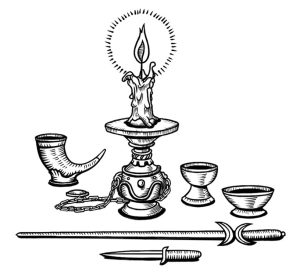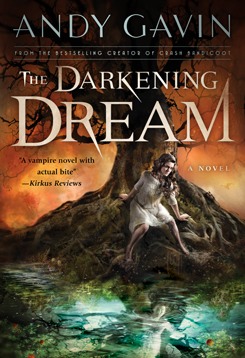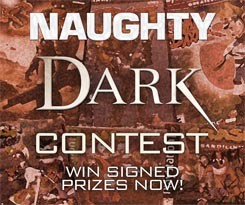- Writing
- Books
- Games
- Movies
- Television
- Food
- Food Review Index
- Foodie Club
- Hedonists
- LA Sushi Index
- Chinese Food Index
- LA Peking Duck Guide
- Eating Italy
- Eating France
- Eating Spain
- Eating Türkiye
- Eating Dutch
- Eating Croatia
- Eating Vietnam
- Eating Australia
- Eating Israel
- Ultimate Pizza
- ThanksGavin
- Margarita Mix
- Foodie Photography
- Burgundy Vintage Chart
- Other
- Gallery
- Bio
- About
- Contact
Archive for Magic
The Look – Pastor Parris
Pastor John Parris is the junior of my two point of view villains in The Darkening Dream. Given the kind of occult woodblock look I’ve been developing I tend to focus on the character’s magical nature to develop their icon.

With Parris I got off to a false start, drawn in by this classic image of Baphomet. It has strong associations with the occult, witchcraft, and demonology. All good stuff that Parris likes to keep close at hand, wrapped in black silk coverings. Or perhaps in a human-skin pouch.

I even had my artists do this rendition (above). But this was a red herring. Truthfully, Baphomet is a nineteenth century rendering, a reinvention of such things in light of 1800s eclecticism. It’s more akin to the effect this image has for us moderns, being cool, exotic, and devilishly naughty. Parris comes from a school of magic that is much more about really believing in fire and brimstone.

So I turned to this kind of image (above) showing a seventeenth century witches sabbath. This is totally apropos, but I didn’t know how to make an icon out of it.

Then I found this view (above) of the witches table. Parris is a ritualist and he often employs candles (lychnomancy) in his magic. The scene was too visually complex, but it was a start.

So I did a ghetto version for my artists (above), using Photoshop to strip away some of the excess and they came back with below, which was about perfect. This shows the tools of Parris’ trade: the candle, the powder horn, bowls for mixing, blades for bloodletting.

Discover more about my novel, The Darkening Dream.
To find out about developing a style for the interior art, see here.
Or for more information on Pastor John Parris, the warlock.
 Title: Jonathan Strange & Mr. Norrell
Title: Jonathan Strange & Mr. Norrell
Author: Susanna Clarke
Genre: Historical Fantasy
Length: 948 pages, 308,931 words
Read: August 20 – September 10, 2011
Summary: Really good, really unusual book
This is one of the best and most unusual books I’ve read in a while, although it’s not for everyone. As you can see it’s quite a tome, clocking in at 308,000 words! It’s set mostly in England during the Napoleonic Wars (first 15 years of the 1800s for historical dolts). It’s also written in a very clever approximation of early 19th century British prose. Think of it as Dickens or Vanity Fair with magic. Actually it’s a little earlier than either of those, but still.
This is not your typical modern novel. It doesn’t have a lot of action. It’s stylistic and archaic voice mostly “tells” (as in “show don’t tell”). But the voice is great, if you like that sort of thing (I did). It’s wry and very amusing, with a defined narrative tone. The voice gives the who book a kind of wry feel, as if we (the reader) are in on something.
It’s also a very character driven story. This is the tale of two magicians, the only two “practical” (i.e. real) magicians to surface in England for some centuries. It’s to a large extent about their quirks and their relationship. There isn’t a ton of action, although there is plenty of magic. There are copious and lengthy asides. Every chapter has several pages of footnotes on magical history! You can skip/skim these if you like.
The historical feel is really good. Most of the characters are “gentlemen” or their servants so their’s is a particular rarified world of the early 19th century British aristocracy. I know quite a bit about this era and it felt pretty characteristic. The Napoleonic Wars are well researched, but they aren’t front and center, serving more as a backdrop. This all has a very British slant to it, which is accurate from the British perspective. I.e. Napoleon is a bit of a bogey man. While the British felt this way, it was mostly propaganda. I’m actually a pretty big Bonaparte fan — he did a lot to shake up and form the modern era — even if he was a “tad” aggressive. The 19th century British Empire was itself staggeringly arrogant and well… imperialistic. But anyway…
I also liked the way the book handles issues of enchantment and perception. This is a very fairy oriented magic — as is appropriate to a historically based English Magic — and it’s treated deftly with a strong sense of the fey. Many of the characters are under strong enchantments, preventing them for hundreds of pages from realizing something which seems rather obvious to us readers. This is both fun and frustrating.
If the book has any problems (besides being a bit long) it’s that the end isn’t entirely satisfying. Things are not really explained to either the characters or the readers. They are wrapped up, but not clarified. So I had the feeling of a grand build up without appropriate payoff. But I did enjoy the journey. This is clearly one of those huge first novels that was like 10 years in the crafting — making it unlikely the author will every exactly repeat the phenomenon.
For more book reviews, click here.
Update 4/28/15, there is a BBC adaption heading our way summer of 2015!
[youtube https://www.youtube.com/watch?v=iE1nsOoTJos] Title: The Spirit Thief
Title: The Spirit Thief
Author: Rachel Aaron
Genre: Light Fantasy
Read: Dec 7-16, 2010
Summary: Ethereal fun.
Between a trip back east, mega editing on my own book, and another parental visit last week I only had time to read five or so novels in December, about a quarter of my usual rate.
Don’t confuse this fun little book with The Lightning Thief, which I also just read and reviewed. The SPIRIT Thief straddles a fairly unique line between totally straight up 80s fantasy and comedic fantasy the likes of River of Dancing Gods or Myth Conceptions. It’s not however as totally comic as those, and somehow seems a bit smaller and lighter (if that’s possible).
The voice is very good, and the opening scene brilliant. There’s a nice new magic system here, where every living thing has a spirit inside that wizards can bargin with, enslave, or what not. Like comedy fantasy Shinto. It’s not entirely evenly developed, but the book is at its best during the magic fights. Although they do have a certainly sketchy quality too them, where the action doesn’t feel entirely blocked out, but I still liked quite a bit of this. The master swordsmen are really nicely done, combining the intrinsic magic of the book with a slightly Robert Jordan-esque blade-master feel. There were moments that almost felt super cool.
The prose can be very wry, in a good way. Funny, without laugh out loud. A lot of this involves attributing emotion to inanimate objects, which given the magical system is perfectly in line. When it’s on, this is certainly very fun to read. But at the same time this levity makes it hard to take the characters too seriously, and certainly not their perils. So it works for and against. I found oddly marooned in a peculiar — albiet unique — tone.
For some reason it also reminded me a bit of Shattered World, one of my high school favorites. Probably because the protagonists is a thief. I maybe wanted it to feel more like that, but it doesn’t feel as big. Everything takes place in a fairly short time and place, and the stakes seem a little local. The light tone also works against the emotional intensity of the characters, and I for the most part feel that they existed to either service the plot, or like the author was more sure of their personality than the character. The villain in particular is of the “i’m very bad, and very mad, and bad at being mad” sort.
So overall I would call the book a snack. But a tasty one.
 Title: Tropic of Night
Title: Tropic of Night
Author: Michael Gruber
Genre: Supernatural Horror Thriller
Read: Spring 2010
Summary: Very good.
I read this book both because it was represented by an agent I was interested in and because it loosely fit the ill-defined cross-genre of my own novel: Supernatural thriller with realistic style and magic. In fact, in this book it’s not even 100% clear that the magic is intended to have actually happened — but I like to think it did. There’s a lot of interesting stuff going on here, particularly to my taste. There are three points of view, and not all are as good. One is the female protagonist, a former anthropologist hiding out in Miami from her murderous African shaman ex-husband. The second is the same character, but told in the format of journals written during her field work in Siberia and Africa. And the third is a Miami Cuban-American police detective investigated a series of horrific murders in Miami (perpetrated by the nasty shaman of course). I loved the detective, his investigations of the ritual crime scenes, and the bit of Cubano Miami flavor . The present action protagonist was okay, and the journals were intermittent. When they got into the magic stuff they were good. What I most loved about this book was the creepy and very realistic feel of the mostly Yoruba based shamanistic magic. Overall I enjoyed reading it, but the book could have benefited from some tightening up. The detective investigating this awful ritual crimes was very good too. If you like murder procedurals, and you like creepy well researched voodoo-esque magic, then give this a read.
Subscribe by email:
More posts on:
Categories
- Contests (7)
- Fiction (404)
- Books (113)
- Movies (77)
- Television (123)
- Writing (115)
- Darkening Dream (62)
- Untimed (37)
- Food (1,862)
- Games (103)
- History (13)
- Technology (21)
- Uncategorized (16)
Favorite Posts
Archives
- January 2026 (3)
- December 2025 (9)
- November 2025 (13)
- October 2025 (12)
- September 2025 (14)
- August 2025 (15)
- July 2025 (16)
- June 2025 (14)
- May 2025 (7)
- April 2025 (4)
- February 2025 (5)
- January 2025 (3)
- December 2024 (13)
- November 2024 (14)
- October 2024 (14)
- September 2024 (15)
- August 2024 (13)
- July 2024 (15)
- June 2024 (14)
- May 2024 (15)
- April 2024 (13)
- March 2024 (9)
- February 2024 (7)
- January 2024 (9)
- December 2023 (8)
- November 2023 (14)
- October 2023 (13)
- September 2023 (9)
- August 2023 (15)
- July 2023 (13)
- June 2023 (14)
- May 2023 (15)
- April 2023 (14)
- March 2023 (12)
- February 2023 (11)
- January 2023 (14)
- December 2022 (11)
- November 2022 (13)
- October 2022 (14)
- September 2022 (14)
- August 2022 (12)
- July 2022 (9)
- June 2022 (6)
- May 2022 (8)
- April 2022 (5)
- March 2022 (4)
- February 2022 (2)
- January 2022 (8)
- December 2021 (6)
- November 2021 (6)
- October 2021 (8)
- September 2021 (4)
- August 2021 (5)
- July 2021 (2)
- June 2021 (3)
- January 2021 (1)
- December 2020 (1)
- September 2020 (1)
- August 2020 (1)
- April 2020 (11)
- March 2020 (15)
- February 2020 (13)
- January 2020 (14)
- December 2019 (13)
- November 2019 (12)
- October 2019 (14)
- September 2019 (14)
- August 2019 (13)
- July 2019 (13)
- June 2019 (14)
- May 2019 (13)
- April 2019 (10)
- March 2019 (10)
- February 2019 (11)
- January 2019 (13)
- December 2018 (14)
- November 2018 (11)
- October 2018 (15)
- September 2018 (15)
- August 2018 (15)
- July 2018 (11)
- June 2018 (14)
- May 2018 (13)
- April 2018 (13)
- March 2018 (17)
- February 2018 (12)
- January 2018 (15)
- December 2017 (15)
- November 2017 (13)
- October 2017 (16)
- September 2017 (16)
- August 2017 (16)
- July 2017 (11)
- June 2017 (13)
- May 2017 (6)
- March 2017 (3)
- February 2017 (4)
- January 2017 (7)
- December 2016 (14)
- November 2016 (11)
- October 2016 (11)
- September 2016 (12)
- August 2016 (15)
- July 2016 (13)
- June 2016 (13)
- May 2016 (13)
- April 2016 (12)
- March 2016 (13)
- February 2016 (12)
- January 2016 (13)
- December 2015 (14)
- November 2015 (14)
- October 2015 (13)
- September 2015 (13)
- August 2015 (18)
- July 2015 (16)
- June 2015 (13)
- May 2015 (13)
- April 2015 (14)
- March 2015 (15)
- February 2015 (13)
- January 2015 (13)
- December 2014 (14)
- November 2014 (13)
- October 2014 (13)
- September 2014 (12)
- August 2014 (15)
- July 2014 (13)
- June 2014 (13)
- May 2014 (14)
- April 2014 (14)
- March 2014 (10)
- February 2014 (11)
- January 2014 (13)
- December 2013 (14)
- November 2013 (13)
- October 2013 (14)
- September 2013 (12)
- August 2013 (14)
- July 2013 (10)
- June 2013 (14)
- May 2013 (14)
- April 2013 (14)
- March 2013 (15)
- February 2013 (14)
- January 2013 (13)
- December 2012 (14)
- November 2012 (16)
- October 2012 (13)
- September 2012 (14)
- August 2012 (16)
- July 2012 (12)
- June 2012 (16)
- May 2012 (21)
- April 2012 (18)
- March 2012 (20)
- February 2012 (23)
- January 2012 (31)
- December 2011 (35)
- November 2011 (33)
- October 2011 (32)
- September 2011 (29)
- August 2011 (35)
- July 2011 (33)
- June 2011 (25)
- May 2011 (31)
- April 2011 (30)
- March 2011 (34)
- February 2011 (31)
- January 2011 (33)
- December 2010 (33)
- November 2010 (39)
- October 2010 (26)
Copyright © 2026 All Rights Reserved



